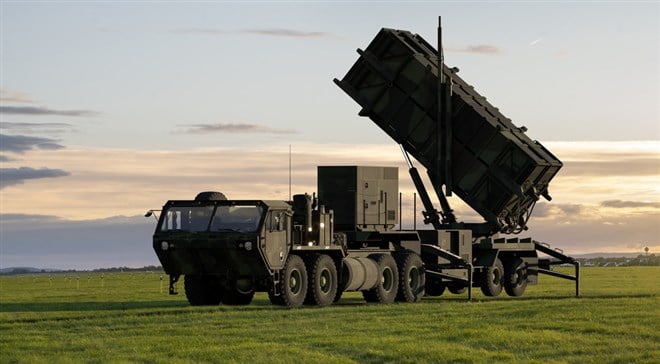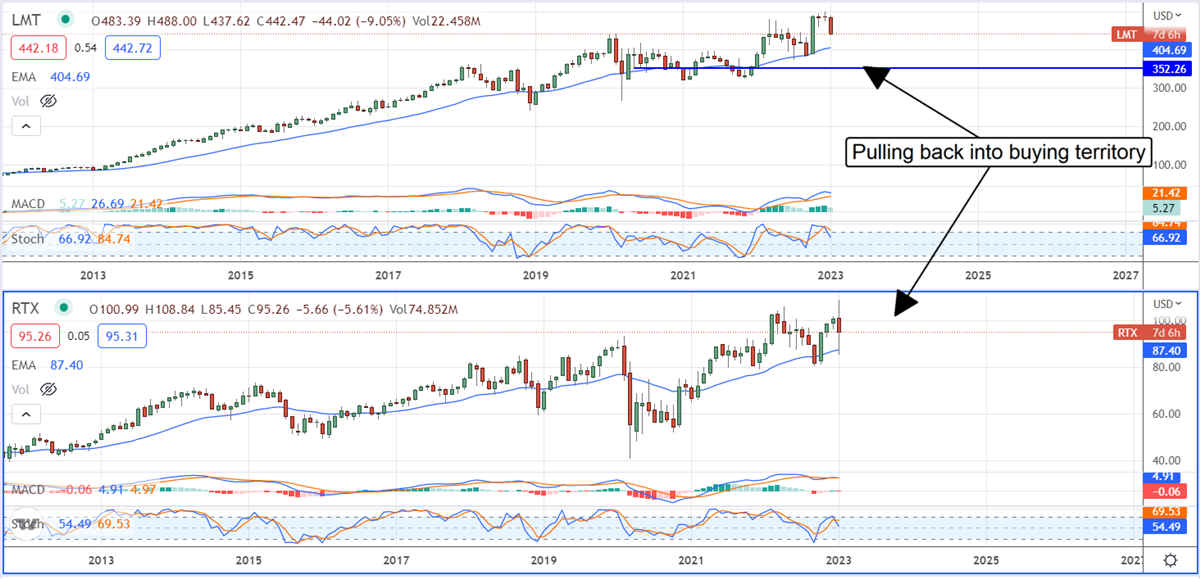
The Q4 reports from Raytheon (NYSE: RTX) and Lockheed Martin (NYSE: LMT) echoed each other in that results are strong, growth is on the table, earnings and cash flow are ample, and capital returns are on the rise. What this means for investors is that it might be time to start getting defensive with these stocks but which one?
They each offer diversification within the defense sector, and they are both stable dividend payers with a healthy outlook for growth, but surely one stands out as the clear winner in this dogfight, right?
Raytheon CEO Comment "Our portfolio is well positioned to capture growing demand, and we expect to deliver sales growth and margin expansion, along with strong free cash flow generation, in 2023. We are deploying capital investments to bring new technologies to market and accelerate productivity improvement. At the same time, remaining committed to returning at least $20 billion to our shareowners post-merger through early 2024."
Lockheed CEO commented: "Our ongoing expansion of 21st Century capabilities and commercial partnerships are delivering deterrence solutions and value-enhancing growth opportunities across our businesses. As we track toward our objective of growth resumption in 2024, we will continue to execute our dynamic and disciplined capital allocation program by reinvesting in our business and pursuing growth opportunities and returning capital to shareholders. We remain confident in our plans to enable our customers to stay ahead of ready and to deliver sustainable economic value."
The Results Are In, Lockheed Outperforms In Q4
Both Raytheon and Lockheed Martin produced solid quarters, but Lockheed Martin stands out. While Raytheon produced growth, the top line was slightly below the analyst consensus, while Lockheed Martin beat the Marketbeat.com consensus figures on both the top and bottom lines.
The $18.99 billion posted by Lockheed is up 7.1% YOY compared to Raytheon’s 6.2% growth, beating the consensus by a strong $0.740 billion. That’s a margin of 400 basis points, and the strength carried through to the bottom line.
Both companies produced YOY earnings growth which shows a strong margin in the face of rising costs and higher interest rates. The difference is that Raytheon adjusted EPS of $1.27, beat by a slim 160 bps while Lockheed’s results of $7.79 rocketed by the consensus by 560 basis points.
The takeaway is that both dividends are strong, but Lockheed’s has stronger support relative to the outlook and is on top of what may be considered a better dividend.
Two Dividend Growth Stocks, One Has A Healthier Outlook
Both Raytheon and Lockheed Martin are dividend growth stocks with a healthy outlook for distribution growth, but once again, Lockheed is outshining its competitor. Raytheon, which is still working through the aftermath of the UTX merger, pays a solid 2.3% dividend yield but trades at 20X its earnings, while Lockheed is paying 2.7% and trading near 16X earnings.
This is compounded by Lockheeds payout ratio and distribution growth CAGR, which are superior to Raytheon's.
Analysts' activity in these stocks is mixed. Lockheed, before the release, received some bearish activity, while Raytheon the opposite. This has Lockheed pegged at a Hold with a price target about 6% above the current price action compared to a stronger Moderate Buy for Raytheon and an uptrending price target 12% above the current price action.
Based on the Q4 results, this trend may change, but the analysts at least support both stocks.
The Technical Outlook: Two Uptrends, Which One Do You Like More?
Looking at the charts, it seems as if the market agrees with this assessment. Both stocks are trending upward in the long term but Raytheon’s trend is much smoother and cleaner. However, the takeaway is that both markets are pulling back to the long-term moving averages (RTX has already produced one bounce) and offering technical entry points.
Assuming the market follows through on this opportunity, both stocks should bounce from their respective EMAs and trend sideways into the end of 2023 if not move up to set new highs and continue their uptrends.





